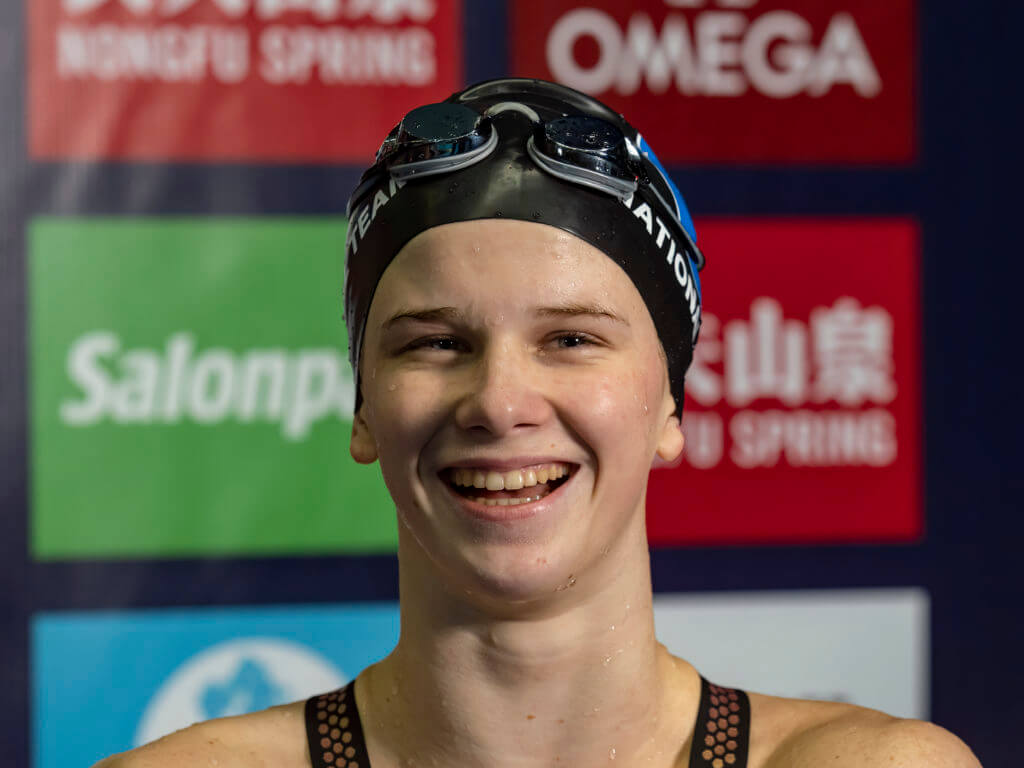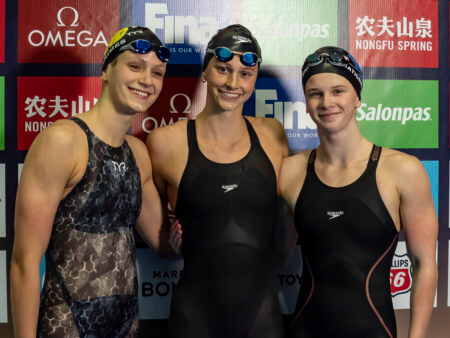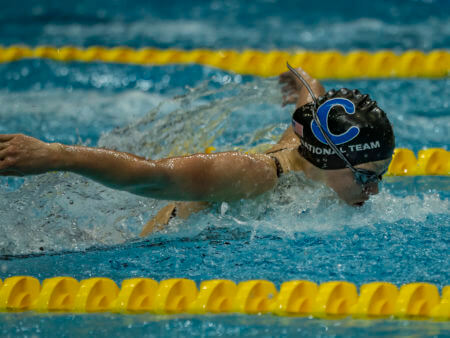Alex Shackell Emerging as Elite Butterfly Talent, Sights on Home Olympic Trials in 2024

Alex Shackell Emerging as Elite Butterfly Talent, Sights on Home Olympic Trials in 2024
In two years since moving to Carmel, Ind., a trip downtown to the IUPUI Natatorium has become a very routine experience for Alex Shackell. Most club and high school swimmers in the Indianapolis area are accustomed to a large slate of meets taking place at the famed facility. At her first high school state championship meet in February, Shackell became the first freshman in the state to ever win a 100 butterfly title, and she had in fact raced at the “Nat” at a routine club meet the last weekend in October.
But when she walked into the facility on the morning of Thursday, November 3, it looked completely different. “This is not the same pool that we were at last week,” Shackell thought to herself. The FINA World Cup was in town, and for the first time, Shackell would race at senior-level international swimmers.
Two months earlier, Shackell had more than held her own at the Junior Pan Pacific Championships in Honolulu. She won five medals at that meet, including individual gold in the 100 fly, bronze in the 200 fly and three relay golds. But as she dove in for the 200 fly that Thursday morning, she was in an event with Summer McIntosh, just a few months older than Shackell but already the top 200 butterfly swimmer in the world, and Hali Flickinger, the top American in the event over the past six years.

Katie Grimes, Summer McIntosh and Alex Shackell after the 200 butterfly at the FINA World Cup in Indianapolis — Photo Courtesy: Peter H. Bick
Once again, Shackell held her own. She placed third in the final behind McIntosh and fellow American teenager Katie Grimes, and she blasted her back half to finish ahead of Flickinger. Time conversions are not always accurate, but Shackell’s short course meters time of 2:05.18 is equivalent to much quicker than her existing short course yards and long course bests.
“That was kind of a strategy going into it, not overswim the first 100 because that’s just not how I do it,” Shackell said. “I have learned over many 200 fly races that my easy speed is not that much slower than a sprint. When I’m more controlled, I end up having more of a flow, and then I’m also not as tired, so it pays off at the end.”
Two days later, Shackell notched another top-three effort in the 100 fly, her mark of 56.63 behind only a pair of veterans, Sweden’s Louise Hansson and France’s Beryl Gastadello. Reflecting on the meet days later, Shackell could only produce positive takeaways.
“I had a good amount of people on my team coming with me, and we weren’t rested at all, so there wasn’t that much pressure to put up anything, which I kind of liked,” Shackell said. “I’m a person who can perform at any time of the season. I’m better when I’m not that much rested, actually.”
Joining the Carmel Legacy
When Shackell’s family moved to Indiana, she joined a swimming program already renowned across the country for holding one of the longest streaks ever in high school sports. Shackell contributed to extending that streak as a high school freshman when she played a key role in Carmel High School’s 36th consecutive girls’ state championship.
But at first, swimming at Carmel was an adjustment. “I hadn’t done a double in my life,” Shackell said. “They did two doubles per week that were at 5 a.m., and I don’t even know if I had woken up that early ever.” Shackell credited a pair of sophomore teammates, Lexie Ward and Lynsey Bowen, for helping her learn “all the really weird things Carmel does,” such as extensive body activation work on pool deck before entering the water for practice, and for providing strong competition in practice.
“It’s kind of nice because they don’t do my events, so we can push each other in different ways and not get too competitive because we’re all really competitive people. I think we’re the most competitive people in the group, the three of us,” Shackell said. “And (Carmel head coach) Chris Plumb is helping me a lot. We’re constantly finding new things to figure out what works best for me.”
Shackell is now very much accustomed to the grueling routine of training at Carmel, which includes double practice on Monday, Tuesday, Thursday and Friday, including dryland prior to swimming Monday and Thursday, as well as afternoon-only practice on Wednesday and Saturday morning.

Alex Shackell at the FINA World Cup in Indianapolis — Photo Courtesy: Peter H. Bick
“The hardest part for me is just getting out of bed,” Shackell said of the weekly routine. “In the morning, when I see the clock say 4:40, that’s the hardest part, but once I brush my teeth and in the car, I’m fine. I would say I’m a pretty positive person. Most of the time, I’m the one who’s energetic and pumping people up for practice, but there’s definitely times when you get in after dryland on a Thursday morning and you can’t feel your body, and you’re like, ‘Oh my gosh, it’s threshold.’”
This season, a new addition to the top training group at Carmel is a returning swimmer who last year became the first ever Carmel alum to qualify for the Olympic team. Shortly after finishing fourth in the 200 freestyle at the World Championships, Drew Kibler returned to his high school program, and Shackell has found Kibler to be a valuable resource. He has provided technical feedback, such as specific focuses in dryland that carry over to swimming, and been an example for taking on tough challenges in practice.
“He doesn’t settle for anything,” Shackell said. “He always wants to be better, and I think that’s sort of like I am, which is why we get along so well. Every day, we talk to each other about how our practice was and things we can work on, so I really like that. It’s not always me going up to him. It’s him coming up to me sometimes, which is nice because it shows that he actually cares about how I’m doing.”
Chasing the Olympics at Home
As Shackell steadily climbs through the rankings among American swimmers, a familiar face is alongside her in the journey. Her older brother, Aaron, was also part of the Junior Pan Pacs team this year, and he secured gold in the 200 fly. Aaron’s time of 1:55.81 was enough to qualify him for the senior-level U.S. National Team this year, and he is committed to swim for Cal beginning next year.
Alex said that the two didn’t hang out much at Junior Pan Pacs, but they support each other and push each other as they each find their footing on the national level.
“It’s really nice just because not everybody has a sibling around the level they are,” Alex said. “It’s nice having him at practice because I can keep up on base with him, and we can hold each other accountable with our goals. Outside the pool, he drives us to and back to the house from practice in the morning and at night, so we get to have good conversations, but it was cool that he made the National Team because he used to be way behind me.”
The goals she is chasing are similar to most steadily-improving teenagers beginning to make an impression on the national level: “Making the Olympics and being an influence for other people,” Shackell said.
That said, she is fully committed to the day-to-day, step-by-step process of trying to reach that pinnacle. She has a mature approach for a high school sophomore who turned 16 Sunday. “I love the sport. I love practicing. I think that’s a big part of improving. To stay in the sport for a long time, you actually have to love it to come every day, and to swim at a high level, you need consistent practices,” Shackell said.
But as for becoming an influence on others, Shackell wants to lean into her own personality and let it show. At Junior Pan Pacs, she dabbed on the podium after winning the 100 fly, and within days, USA Swimming had posted a video compilation of Shackell dabbing.
“That’s part of what makes me special. No one else is doing that. People have told me that they found it funny or that they’re starting to dab. I thought that was really cool, and it’s why I want to keep doing it,” Shackell said. “It just kind of puts the fun into it.”
It’s that kind of harmless humor that brings some much-needed frivolity to a grueling routine — not to mention some fire emojis into Shackell’s Instagram direct messages from younger swimmers on the Carmel team.
Shackell will race for a spot on the 2024 Olympic team at Lucas Oil Stadium, home of the NFL’s Indianapolis Colts, and yes, she plans to stay at home instead of in a hotel. She will make that short drive into downtown from her own house for each session, a time she describes as perfect for mentally preparing for what is to come in that session. As hundreds of swimmers pursue their dreams in June 2024, Shackell will be one of the few sleeping in her own bed.
Carmel has been best known throughout the swimming world for the success of its girls’ teams, in particular the 36 consecutive state titles, but it’s ironic that the first two Carmel alumni to qualify for an Olympic team were male swimmers, with Kibler qualifying for the 800 free relay at the Tokyo Games and Jake Mitchell also making the team in the 400 free.
“That can change,” Shackell said. “It will change.”



